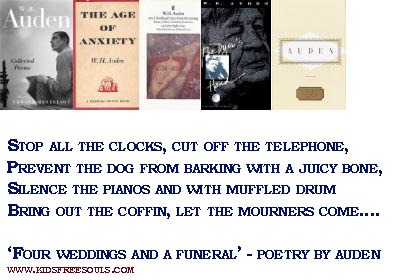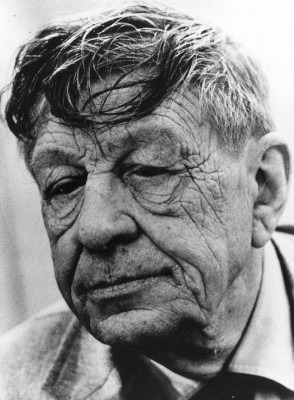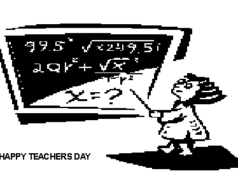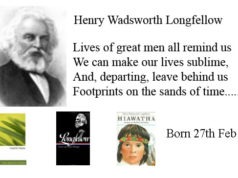Wystan Hugh Auden
1907-1973) Born on 20th February 1907
W.H. Auden, an English born poet was born in York, England, in 1907 (20th Feb). He made a remarkable contribution and best known for variety of his works W.H. Auden has written the best ballads, blues, limericks, sonnets, nonsense verse, oratorios, free verse, librettos (words) for operas and dramas.
He won the Pulitzer Prize in 1946 for his book length poem The age of anxiety,: A baroque eclogue
As an amateur poet in his younger days, he was influenced by the poetry of Thomas Hardy, Robert Frost, William Blake, Emily Dickinson, Gerard Manley Hopkins, and Old English verse. He had a remarkable wit and often mimicked the writing styles of these poets.
In 1928, Auden published his first book of verse, and his collection Poems, published in 1930, established him as the leading voice of a new generation. He visited Germany, Iceland, and China, served in the Spanish Civil war, and in 1939 moved to the United States, where he met his lover, Chester Kallman.
In Oxford University, Auden was the leader of a group of brilliant writers. Later he turned to Christianity and psychoanalysis as a partial solutions to the problems of civilization. Auden settled in US in 1939 and later became a US citizen.
Auden has remarkable contribution but the most known collaboration was with Christopher Isherwood on travel books and several symbolic and satirical plays in the 1930s. This included The Dog Beneath the Skin (1935) and The Ascent of F6 (1936). He also helped to write Libretto to a Russian composer Igor Stravinsky’s Opera The Rake’s Progress. Many of his essays were published in The Dyer’s Hand (1963).
W. H. Auden was a Chancellor of The Academy of American Poets from 1954 to 1973, and divided most of the second half of his life between residences in New York City and Austria. He died in Vienna in 1973.
After reading a Child’s Guide to Modern Physics
Prose
Letters from Iceland (1937)
Journey to a War (1939)
Enchaféd Flood (1950)
The Dyer’s Hand (1962)
Selected Essays (1964)
Forewords and Afterwords (1973)
Anthology
Selected Poems by Gunnar Ekelöf (1972)
Drama
On the Frontier (1938)
Paid On Both Sides (1928)
The Dog Beneath the Skin: or, Where is Francis? (1935)
The Ascent of F.6 (1936)
The Dance of Death (1933)
W. H. Auden
Stop all the clocks, cut off the telephone,
Prevent the dog from barking with a juicy bone,
Silence the pianos and with muffled drum
Bring out the coffin, let the mourners come.
Let aeroplanes circle moaning overhead
Scribbling on the sky the message He Is Dead,
Put crepe bows round the white necks of the public doves,
Let the traffic policemen wear black cotton gloves.
He was my North, my South, my East and West,
My working week and my Sunday rest,
My noon, my midnight, my talk, my song;
I thought that love would last for ever: I was wrong.
The stars are not wanted now: put out every one;
Pack up the moon and dismantle the sun;
Pour away the ocean and sweep up the wood.
For nothing now can ever come to any good.
One of Auden’s Poems above was read at the funeral responsible for part of the name of the ‘Four weddings and a funeral’ movie.
A clip from the Movie on my You Tube :
Four weddings and a Funeral in Fav Vlogs
{loadposition auden}
Poetry by W.H. Auden
The Orators prose and verse (1932)
Another Time (1940)
The Double Man (1941)
Collected Poetry (1945)
Collected Shorter PoemsNones (1952)
1930-1944 (1950)
About the House About the House (1965)
Academic Graffiti (1971)
City without Walls (1969)
Collected Longer Poems (1968)
Collected Poems (1991)
Collected Shorter Poems 1927-1957 (1966)
Epistle to a Godson (1972)
For the Time Being (1944)
Homage to Clio (1960)
Look, Stranger! in America: On This Island (1936)
Poems (1930)
Selected Poems (1979)
Selected Poetry (1956)
Spain (1937)
Thank You, Fog: Last Poems (1974)
The Age of Anxiety: A Baroque Eclogue (1947)
The Old Man’s Road (1956)
The Quest (1941)
The Sea and the Mirror (1944)
The Shield of Achilles (1955)









